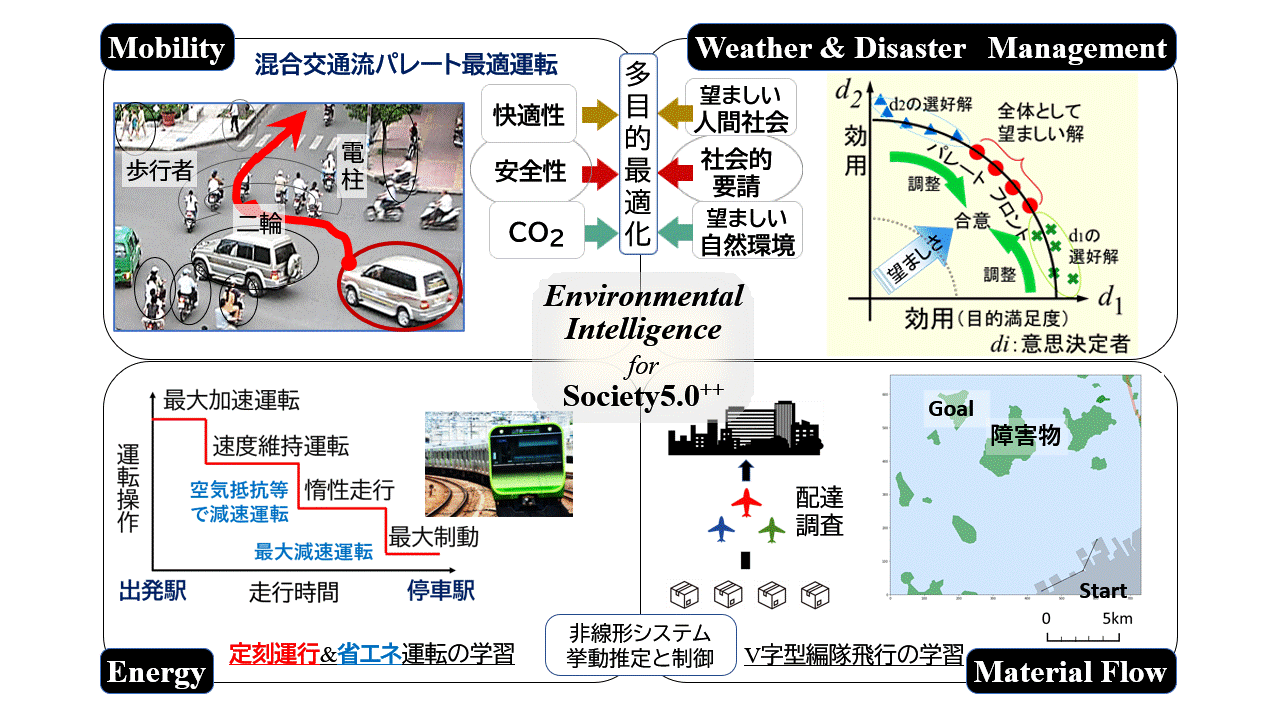Laboratories
Electrical System Engineering
System Control Lab [Lab's website]
- Professor: Kang-Zhi Liu [System Control, Control Theory, Smart Grid, Power Systems, and Control Applications]
System control engineering, which was inspired by the invention of Watt's steam engine, is now an indispensable technology for automating various systems such as aircraft and robots. The system design theory that supports this technology is constantly evolving into a more sophisticated and beautiful system. In this field, we study cutting-edge nonlinear control theory, switching control theory, robust control theory, and system integration theory for solving the problems facing system control technology. In addition to this, through smart-grid, high-performance optimal control in the field of power electronics, power system stabilization, optimal tracking control of robots, feedback control using quantized data, etc. , We are striving to develop control technology that contributes to society.

Power Conversion Lab [Lab's website]
- Professor: Yukihiko Sato [Power Electronics, Electric Machinery, Power System Control, and Energy Network]
- Assoc. Prof.: Kenji Natori [Energy Network, New Energy, Motion Control, and Control Engineering]
- Tech. Staff: Makoto Chiba
Power electronics technology, which is based on power conversion by using semiconductor power devices, is an essential technology for home appliances, electric vehicles, new energy usage, and so on. It is therefore expected to make significant contributions to energy saving and global warming prevention. Our group studies power converter systems and their applications as research subjects of power electronics. The main research themes include topologies and control methods that lead to performance improvement of power converters, next-generation energy networks achieved by power converter systems, and power converters and their applications to effectively use new energy sources in place of fossil fuels. But the themes are not limited to the above ones, since power electronics is essential in a wider range of areas as previously described. We try to explore future directions and prospects of power electronics based on circuit theory and electromagnetics, which are foundations of electrical energy engineering.

Electrical Energy Applications Lab [Lab's website]
- Professor: Daisuke Miyagi [Applied Magnetics, Superconduction Application, Electric Machinery, Magnetic Field Analysis, and Magnetic Measurement System]
- Asst. Prof.: Hiroyasu Kobayashi [Electric Machine, Motor Drive, Power Electronics, Electric Mobility]
Since electric energy can be highly efficiently converted to other energies such as magnetic and mechanical energies, its applied technologies are diverse. Our laboratory conducts educational researches on the characteristic analysis and design method of electric energy converting apparatuses based on a practical understanding of physical phenomena such as electromagnetics and circuit theory. We are specifically aiming at designing next-generation high-efficiency and high-energy-density electrical apparatuses using DC-DC power conversion technology, superconducting application technology, nonlinear magnetic application technology, etc. We are engaged in those developments based on both electromagnetic simulation and experimental approaches.
Electronic System Engineering
Fundamentals of Electrical and Electronics Lab [Lab's website]
- Professor: Ken Morita [Semiconductor quantum nanostructures, Semiconductor spintronics, Terahertz nonlinear optics, Ultrafast spectroscopy, and Semiconductor optical properties]
- Assoc. Prof.: Takashi Kakue [Information optics, Holography, Optical control, 3D measurement, and High-speed/Ultra-high-speed imaging]
- Assoc. Prof.: Hiroyuki Nakata [Aeronomy, Ionospheric disturbance, Radio propagation, Atmospheric waves, Natural hazards]
- Asst. Prof.: HIroyo Ohya [Aeronomy, D- and E-region ionosphere, Tweek atmospherics, VLF/LF standard radio waves, AVON (Asia VLF observation network) ]
- Tech. Staff: Youhei Kawamura
In our laboratory, we are studying the region from the atmosphere to the space around the Earth, especially the ionosphere. In the ionosphere, the phenomena, such as aurora borealis, due to the effects from the upper region occur because plasmas from the sun precipitate into the atmosphere. Those due to the effects from the lower atmosphere also occur because the atmospheric waves are generated by earthquakes and typhoons and the energy of the wave is transferred to the ionosphere. Therefore, the ionosphere is always fluctuated by the energy flux from above and below. Our research is based on the discovery of unknown phenomena in this area and the clarification of the cause of these phenomena. We aim to contribute to the use of space by humanity through our research. In international cooperation with researchers, we employ various antennas to observe radio waves in various bands in Japan and overseas and analyze various satellite data including GPS.
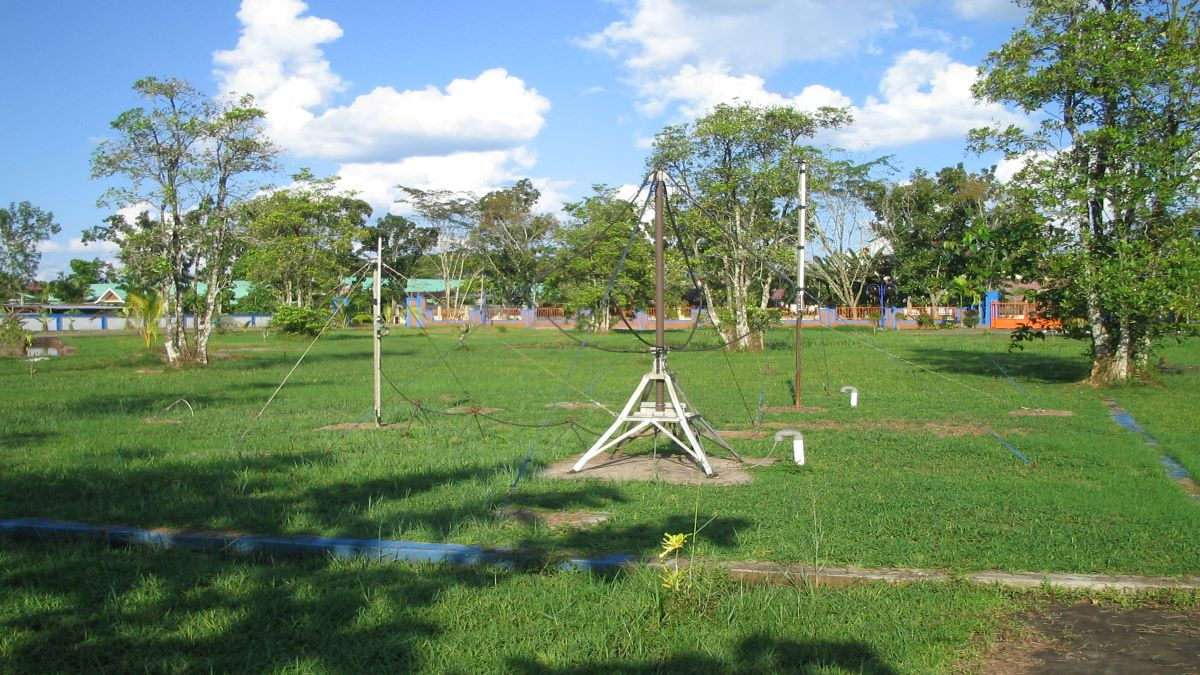
Quantum Device Physics Lab [Lab's website]
- Professor: Yoshihiro Ishitani [Semiconductor optical devices, Phonon engineering, Terahertz wave, Quantum optics, Semiconductor spectroscopy, Semiconductor optical devices, and Nitride Semiconductors]
- Asst. Prof.: Bei Ma [Nitride semiconductors, Crystal growth technology, Semiconductor optical devices, Process technology, and Nanostructures semiconductor photophysics]
- Tech. Staff: Kensuke Ohki
We conduct education and research from the basics to the application of optoelectronic properties and optical devices of semiconductors including wide gap semiconductors. Optoelectronics is becoming more and more important in high-speed and large-capacity optical communication, large-capacity information recording, information safety, high-efficiency solar cells, and spectroscopic measurement for medical and life phenomenon search. We are investigating a wide wavelength range from ultraviolet to terahertz (THz), and using extreme measurement techniques such as ultrafast spectroscopy and far-infrared spectroscopy, we grasp the movement of atoms and electrons to clarify the physical phenomena in semiconductors. , We are engaged in exploratory research on the advanced quantum physics effects and the essence of light appearing in nanostructures, and making pioneering device proposals based on this research.
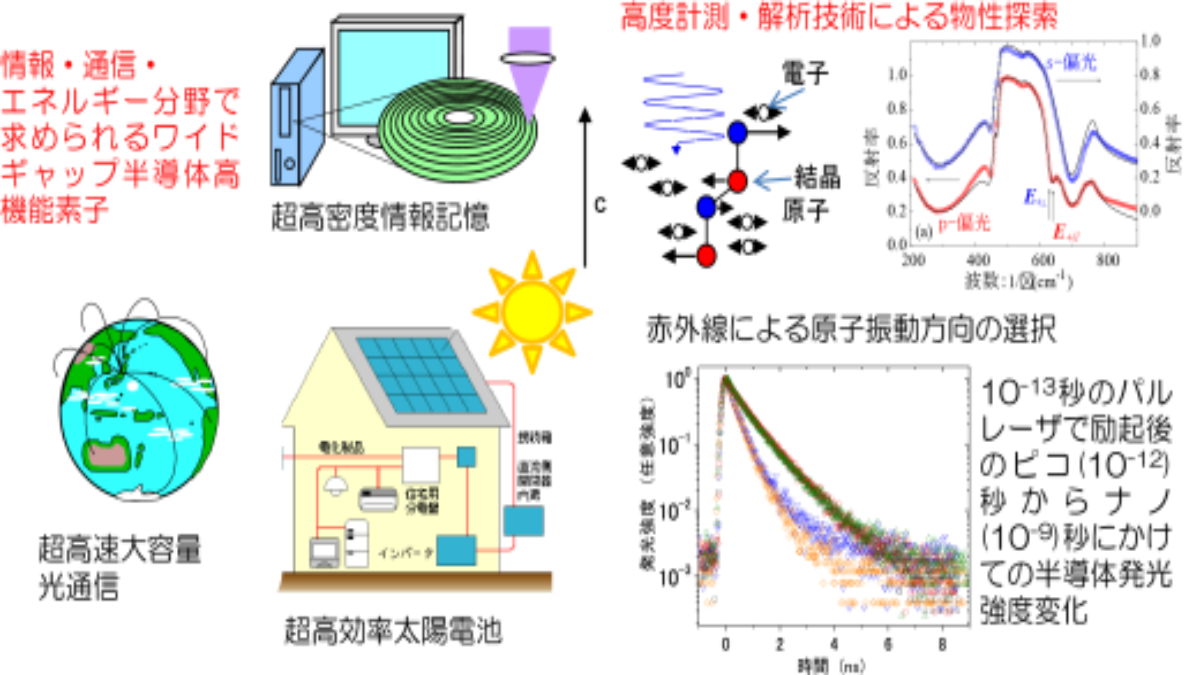
Electronic Device Engineering Lab [Lab's website]
-
Assoc. Prof.: Masatoshi Sakai [Printed Electronics, Phase Transition Electronics, Ultrathin Flexible & Quantum Electronics, and Molecular Nanodevice]
Based on the semiconductor engineering and solid-state electronics, we are widely conducting education and research related to new functional electronic devices to develop future technologies. Recent research themes include, (1) nanosecond time-resolved analysis of organic electroluminescence panel, transistors, photovoltaics, (2) development of novel printed electronics and printing of IoT devices, (3) development of new principle high-speed quantum phase transition transistor with strongly-correlated materials, (4) characterization of ultrathin & quantum devices, (5) development of advanced electromagnetism devices. We are engaged in research on the physical properties and device application of new electronic devices.
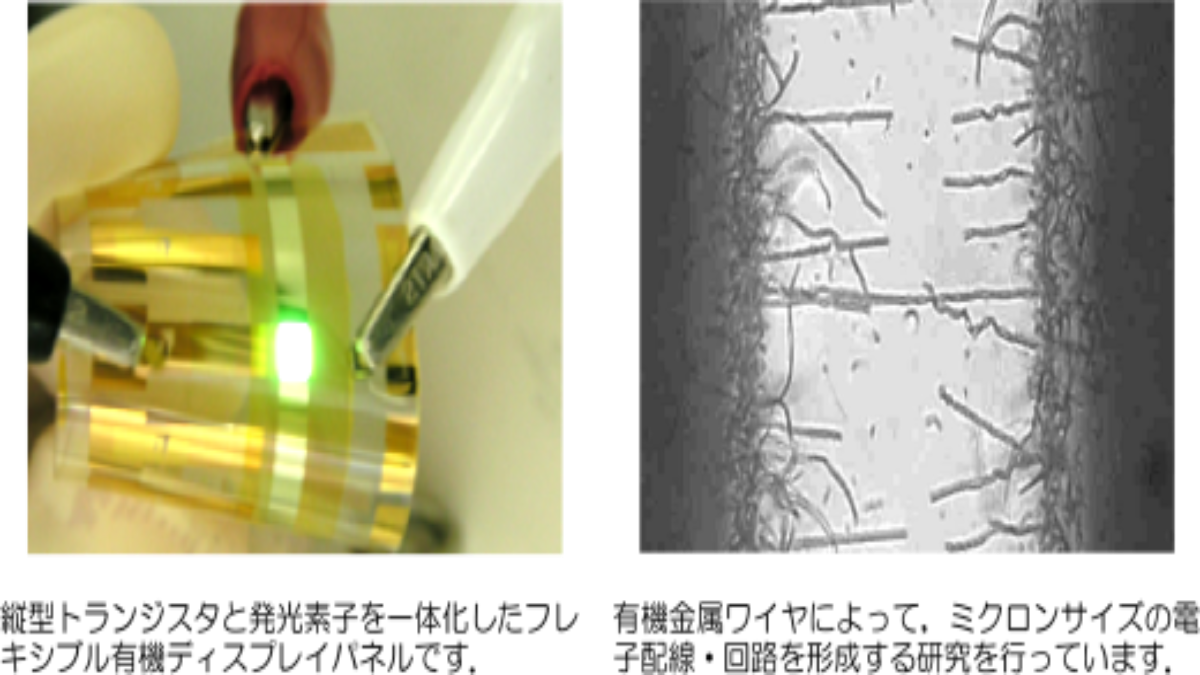
Information and Communication Engineering
Communication, AI and Signal Processing Lab [Lab's website]
- Professor: Chang-Jun Ahn [Communication theory, MIMO communication systems, RF circuit theory, Software radios, and Cognitive radio]
- Professor: Jae-Sang Cha [Digital communication, Broadcasting technology, Energy IT, and IT convergence technology]
- Tech. Staff: Satoko Nanba
- Assistant Administrative Staff: Hideko Tamura, Izumi Endo
The performance of electronic communication systems, such as mobile phones, is essentially dominated by the performance of the high-frequency part of the transceiver. In this field, we mainly aim to improve the performance of various high-frequency electronic circuits used for them, electronic elements used for them, and signal processing functions. Multi-disciplinary research on realization of high-performance and high-performance high-frequency filters and high-performance oscillators, development of optimization tools and simulation tools for their design, innovative communication methods, and realization of new signal processing functions doing.
Wave Electron Devices Lab
- Assoc. Prof.: Tatsuya Ohmori [Elastic wave devices, Electronic circuits, High-frequency circuits, Optical fiber sensors, and Wireless sensors]
System Mathematics Lab [Lab's website]
- Professor: Seiichi Koakutsu [Computer Engineering, VLSI Layout CAD, Stochastic Optimization, and Evolutionary and Learning System]
- Tech. Staff: Kimihiro Nakama
With a major theme of research related to modeling, analysis, design, and optimization of large-scale complex systems, we are researching mathematical methods and algorithms that realize these, both theoretically and practically. Specifically, (1) engineering applications of biological systems and ecosystems, (2) optimal design of low power consumption, high-performance VLSI and dynamically reconfigurable FPGA, (3) behavior control and emergence of intelligent robots (4) Application of soft computing centering on optimization technology to engineering systems, (5) Development and analysis of optimization methods using nonlinear dynamical systems such as chaotic dynamical systems, etc.
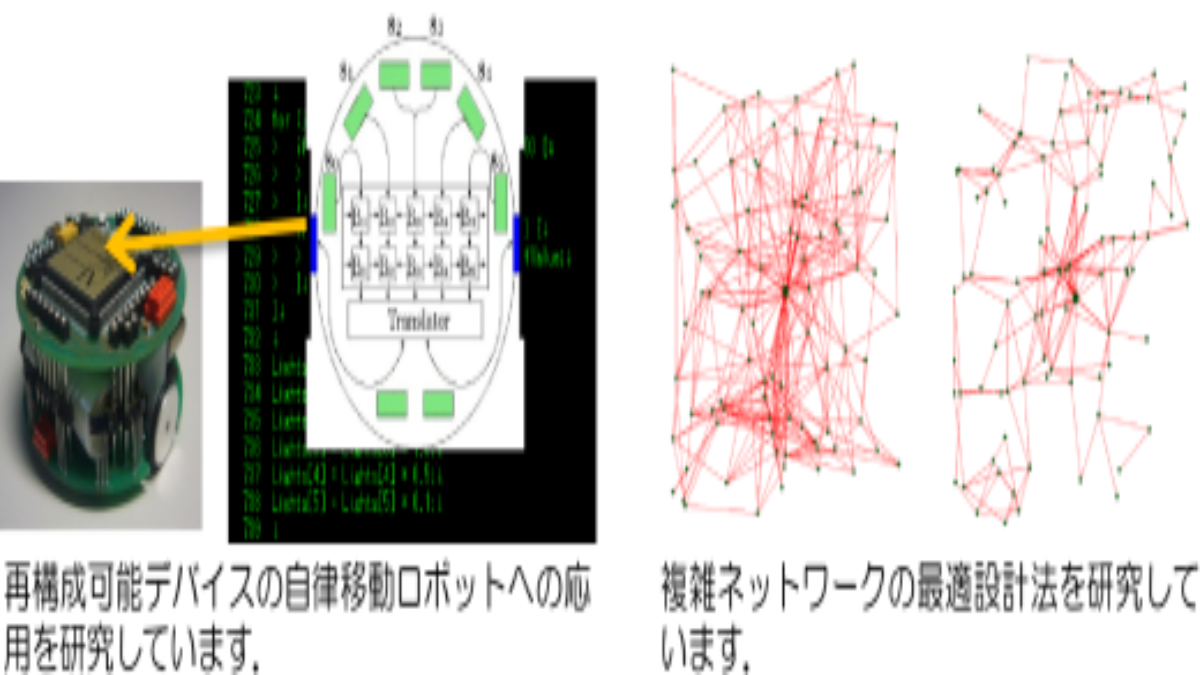
Electronic Information System Lab [Lab's website]
- Professor: Tomoyoshi Ito [Computer science, Dedicated computer, Hardware, Numerical calculation, Electro-holography, and Three-dimensional display]
- Professor: Tomoyoshi Shimobaba [Holography, Wave optics, Computer engineering, Three-dimensional image processing and sensing, and Three-dimensional display]
- Asst. Prof.: Fan Wang [Optical information processing, Optics imaging, 3D display, holography]
We are conducting researches using electronic information technology. The main theme of our researches is to develop next-generation image/visualization systems such as 3D display and 3D microscope using holography, which is said to be the ultimate 3D imaging technology. To achieve this, speeding up calculations is essential. To that end, we are working on the development of dedicated hardware by LSI circuit design, and the construction of parallel systems using highly parallel processors such as GPUs.
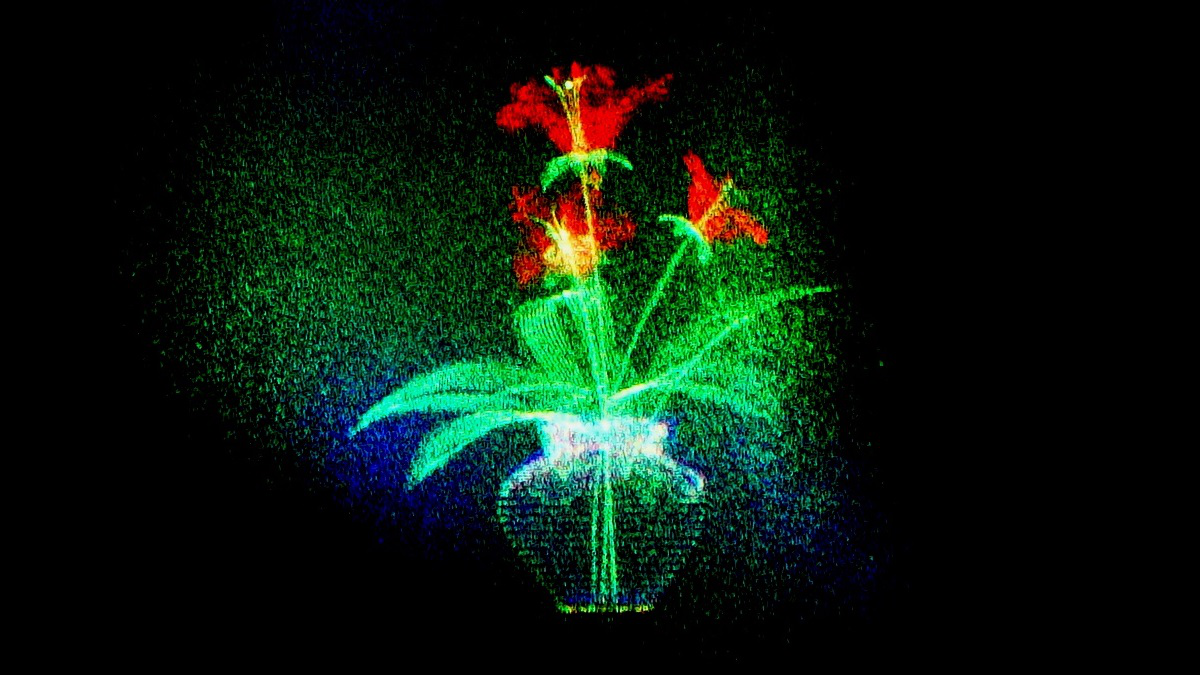
Environmental Intelligence System Lab [Lab's website]
- Professor: Sachiyo Arai [Group intelligence, Distributed artificial intelligence, Reinforcement learning, Multi-agent learning]
Artificial Intelligence (AI) is a research field that has operationalized, integrated, and developed basic theories from various fields. Our research includes the brain science and the mechanism of thinking. In particular, we focus on the "engineering-enabled" aspects of intelligence. More specifically, we aim to build systems that support people from the aspects of transportation (autonomous operation of cars, drones, and submersibles), energy planning, and logistics by reproducing the learning and evolution of intelligent cooperation, and competition among multiple humans and multiple robots. Since these problems are highly dependent on the environment, they involve many challenging issues not only optimality but also robustness to change, safety for humans, and white-boxing so that people can trust the solutions produced by AI.
